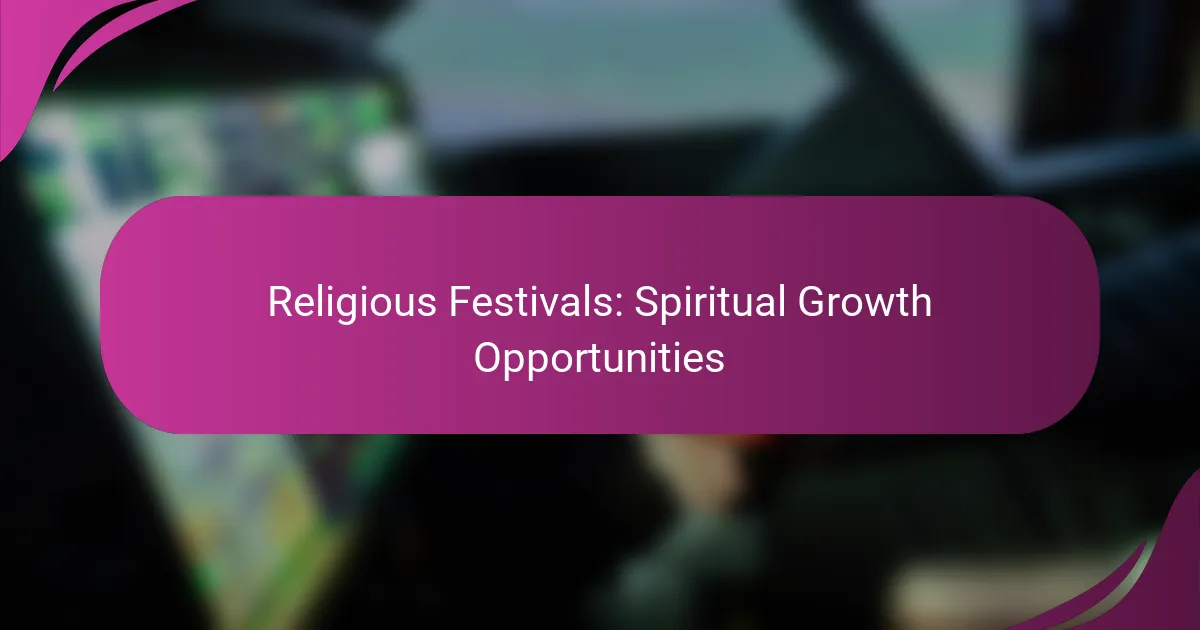Religious festivals serve as powerful catalysts for spiritual growth, offering individuals the chance to engage with their communities, participate in meaningful rituals, and reflect on their beliefs. Celebrated across various cultures, these festivals, such as Diwali, Easter, and Ramadan, provide unique opportunities to deepen one’s faith and foster a sense of belonging. By choosing a festival that resonates with personal beliefs, individuals can enhance their spiritual journeys through shared experiences and communal activities.
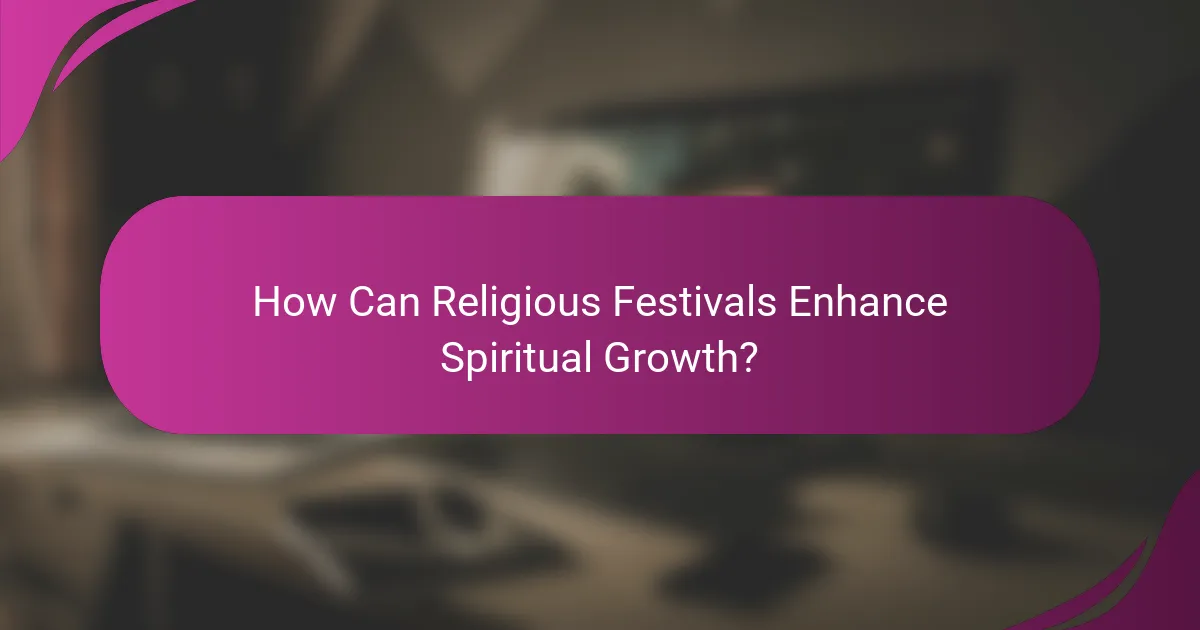
How Can Religious Festivals Enhance Spiritual Growth?
Religious festivals can significantly enhance spiritual growth by providing opportunities for community engagement, ritual participation, and personal reflection. These experiences often foster a deeper connection to one’s faith and promote a sense of belonging within a spiritual community.
Community engagement
Participating in religious festivals encourages community engagement, which is vital for spiritual development. These events often bring together individuals from diverse backgrounds, creating a sense of unity and shared purpose. Engaging with others in a spiritual context can strengthen relationships and foster a supportive environment.
Examples of community engagement include volunteering for festival preparations, participating in group prayers, or attending communal meals. Such activities not only enhance personal connections but also deepen one’s understanding of collective beliefs and values.
Ritual participation
Ritual participation during religious festivals allows individuals to actively engage with their faith. These rituals often involve symbolic actions, prayers, and ceremonies that reinforce spiritual beliefs. By taking part in these practices, individuals can experience a heightened sense of spirituality and connection to their faith.
For instance, lighting candles during a festival or performing traditional dances can evoke strong emotional responses and deepen one’s commitment to their beliefs. It’s essential to approach these rituals with intention and openness to fully benefit from the experience.
Personal reflection
Personal reflection is a crucial aspect of spiritual growth during religious festivals. These occasions often provide a break from daily routines, allowing individuals to contemplate their beliefs, values, and life choices. Setting aside time for introspection can lead to greater self-awareness and spiritual clarity.
To maximize personal reflection, consider journaling about your experiences during the festival or meditating on the teachings associated with the event. Engaging in these practices can help solidify insights gained and encourage ongoing spiritual development beyond the festival itself.
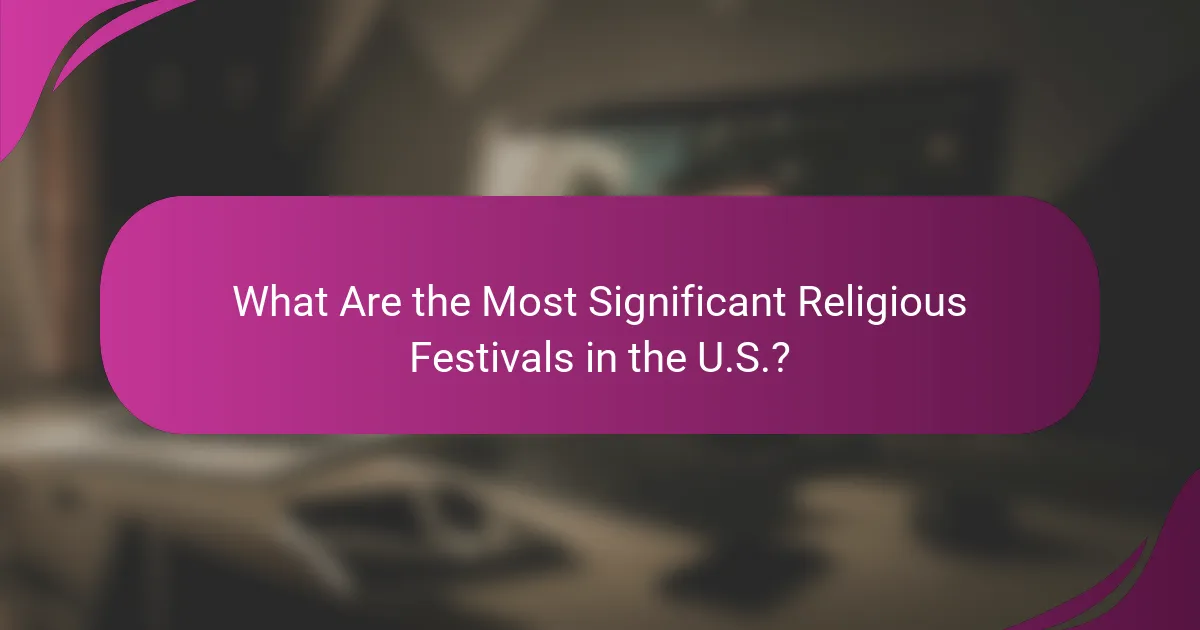
What Are the Most Significant Religious Festivals in the U.S.?
The U.S. hosts a variety of significant religious festivals that provide opportunities for spiritual growth and community engagement. These festivals, including Diwali, Easter, and Ramadan, reflect the diverse beliefs and practices of the population and offer unique ways to deepen one’s faith.
Diwali
Diwali, known as the Festival of Lights, is celebrated by millions of Hindus, Sikhs, and Jains across the U.S. It typically occurs in October or November and symbolizes the victory of light over darkness and good over evil. Participants often decorate their homes with lights, share sweets, and engage in prayers and rituals.
To fully embrace Diwali, consider hosting or attending a community gathering. This can include lighting diyas (oil lamps), participating in traditional dances, or enjoying festive meals with family and friends. Engaging in acts of charity during this time is also a common practice that enhances the spirit of giving.
Easter
Easter is a central Christian festival celebrating the resurrection of Jesus Christ, usually occurring in March or April. It is marked by various traditions, including attending church services, participating in Easter egg hunts, and sharing festive meals with loved ones. The date of Easter varies each year, based on the lunar calendar.
To make the most of Easter, consider attending a sunrise service or participating in community events that reflect the holiday’s themes of renewal and hope. Engaging in volunteer work during this time can also provide a meaningful way to connect with others and embody the spirit of the season.
Ramadan
Ramadan is the holy month of fasting for Muslims, observed by millions in the U.S. from dawn until sunset. It typically lasts 29 to 30 days and is a time for spiritual reflection, prayer, and community. Fasting during Ramadan is one of the Five Pillars of Islam and encourages self-discipline and empathy for those in need.
To observe Ramadan effectively, plan your meals around suhoor (pre-dawn meal) and iftar (meal to break the fast). Many communities host iftar gatherings, which can be a great way to connect with others. Additionally, consider dedicating time for prayer and reading the Quran to enhance your spiritual experience during this sacred month.
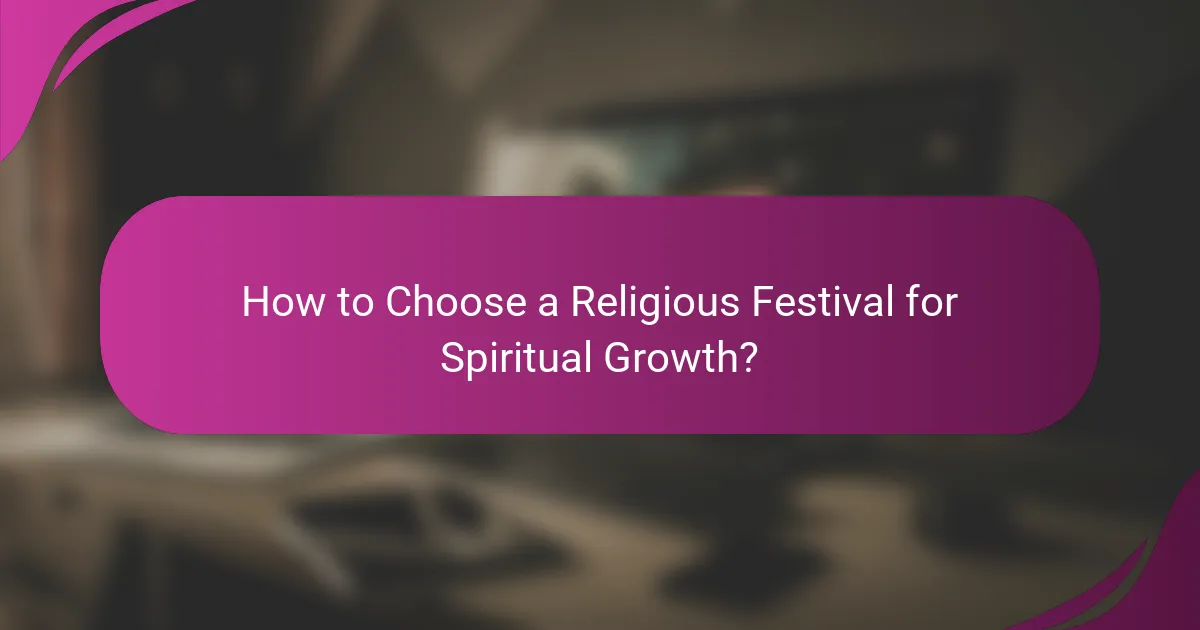
How to Choose a Religious Festival for Spiritual Growth?
Selecting a religious festival for spiritual growth involves aligning your personal beliefs with the festival’s themes and activities. Consider how the festival’s community engagement and specific practices can enhance your spiritual journey.
Consider personal beliefs
Your personal beliefs are fundamental in choosing a religious festival. Reflect on your spiritual values and the teachings that resonate with you. For instance, if you value compassion and community service, look for festivals that emphasize these themes.
Research the underlying principles of the festival. Some festivals may focus on meditation and introspection, while others might celebrate communal worship or charitable acts. Ensure that the festival’s core message aligns with your spiritual aspirations.
Evaluate community involvement
Community involvement plays a significant role in the spiritual experience of a festival. Engaging with others who share similar beliefs can deepen your understanding and provide support. Look for festivals that encourage participation, such as volunteering opportunities or group activities.
Consider the size and nature of the community involved. Smaller, local festivals may offer more intimate settings for connection, while larger events might provide diverse perspectives. Assess what type of community atmosphere will best support your spiritual growth.
Assess festival activities
The activities offered at a festival can greatly influence your spiritual experience. Evaluate whether the festival includes workshops, rituals, or discussions that align with your interests. Activities such as meditation sessions, prayer circles, or educational talks can enhance your understanding and practice.
Check the schedule of events to ensure there are opportunities for both reflection and interaction. A balanced mix of activities can cater to different aspects of spiritual growth, allowing for both personal introspection and communal engagement.
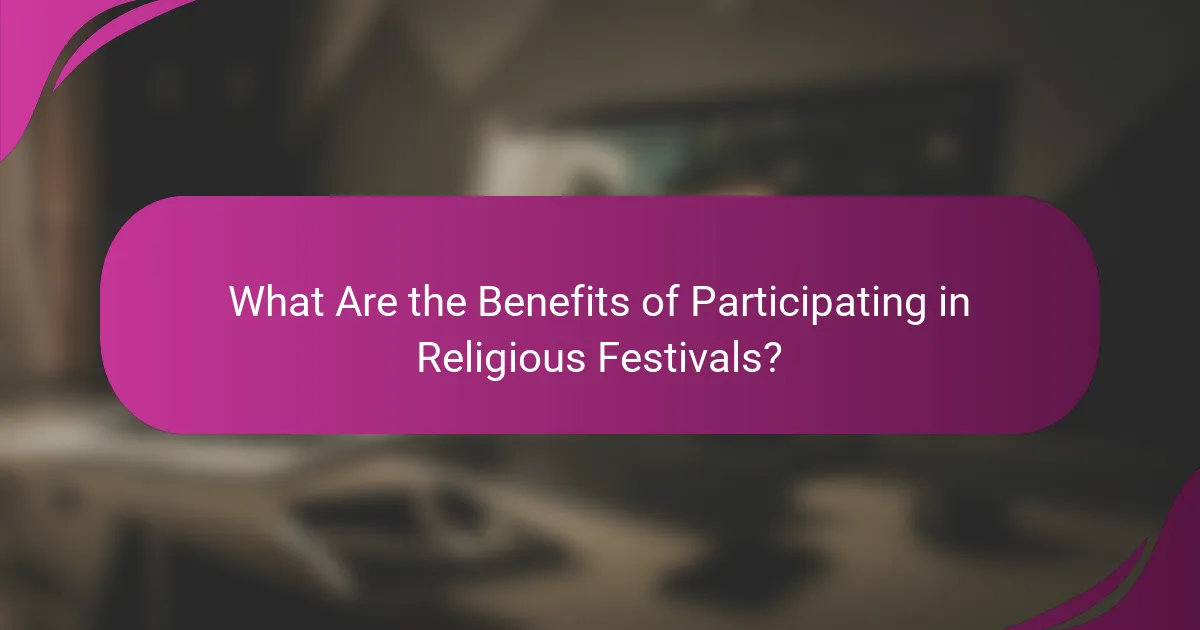
What Are the Benefits of Participating in Religious Festivals?
Participating in religious festivals offers numerous benefits, including opportunities for spiritual growth, community engagement, and cultural enrichment. These events foster a sense of belonging and provide a platform for individuals to deepen their faith and connect with others.
Deepened faith
Engaging in religious festivals can significantly enhance one’s spiritual journey. These events often include rituals, prayers, and teachings that reinforce core beliefs and values. For many, the immersive experience helps to cultivate a stronger personal connection with their faith.
Consider attending services, participating in communal prayers, or engaging in reflective practices during these festivals. These activities can lead to profound moments of insight and renewal, allowing individuals to explore their spirituality in a supportive environment.
Stronger community ties
Religious festivals serve as a vital link between individuals and their communities. They provide a space for people to gather, share experiences, and support one another, fostering a sense of unity and belonging. This collective participation can strengthen relationships and create lasting bonds among community members.
To maximize community engagement, consider volunteering for festival activities or joining group discussions. These actions not only enhance personal connections but also contribute to a more vibrant and cohesive community atmosphere.
Enhanced cultural understanding
Participating in religious festivals allows individuals to gain insights into different cultures and traditions. These events often showcase unique customs, foods, and practices that reflect the diversity within a community. Engaging with these elements can broaden one’s perspective and foster respect for different beliefs.
To deepen your cultural understanding, take the time to learn about the history and significance of the festival you are attending. Engaging with diverse groups and asking questions can enrich your experience and promote intercultural dialogue.
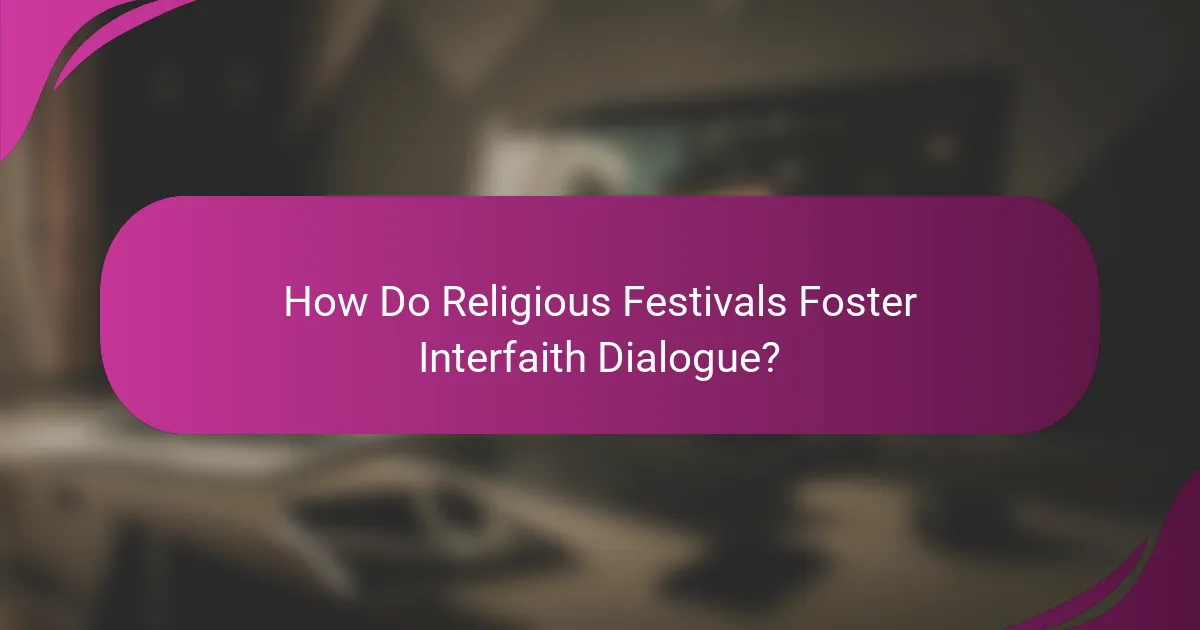
How Do Religious Festivals Foster Interfaith Dialogue?
Religious festivals create opportunities for interfaith dialogue by bringing together diverse communities to celebrate shared values and traditions. These gatherings encourage understanding, respect, and collaboration among different faiths, fostering a sense of unity in diversity.
Shared experiences
Shared experiences during religious festivals allow individuals from various backgrounds to connect on a personal level. Activities such as communal meals, music, and rituals create a common ground where participants can engage with one another, breaking down barriers and misconceptions.
For instance, during Diwali, people from different faiths may join in lighting lamps and sharing sweets, symbolizing the triumph of light over darkness. Such interactions promote empathy and understanding, essential components of interfaith dialogue.
Collaborative events
Collaborative events during religious festivals often involve joint activities that highlight the values of cooperation and mutual support. Workshops, discussions, and cultural performances can be organized to showcase the richness of each faith while emphasizing common ethical principles.
For example, a community might host an interfaith peace concert during a festival, inviting musicians from various traditions to perform together. This not only entertains but also educates attendees about different beliefs and practices, fostering a spirit of collaboration.
Mutual respect
Mutual respect is a cornerstone of interfaith dialogue fostered by religious festivals. When individuals participate in each other’s celebrations, they demonstrate an appreciation for diverse traditions and beliefs. This respect is crucial for building trust and open communication.
Practicing mutual respect can involve simple acts, such as asking questions about unfamiliar customs or being open to learning about different religious practices. By valuing each other’s perspectives, communities can create a more inclusive environment that encourages ongoing dialogue and understanding.
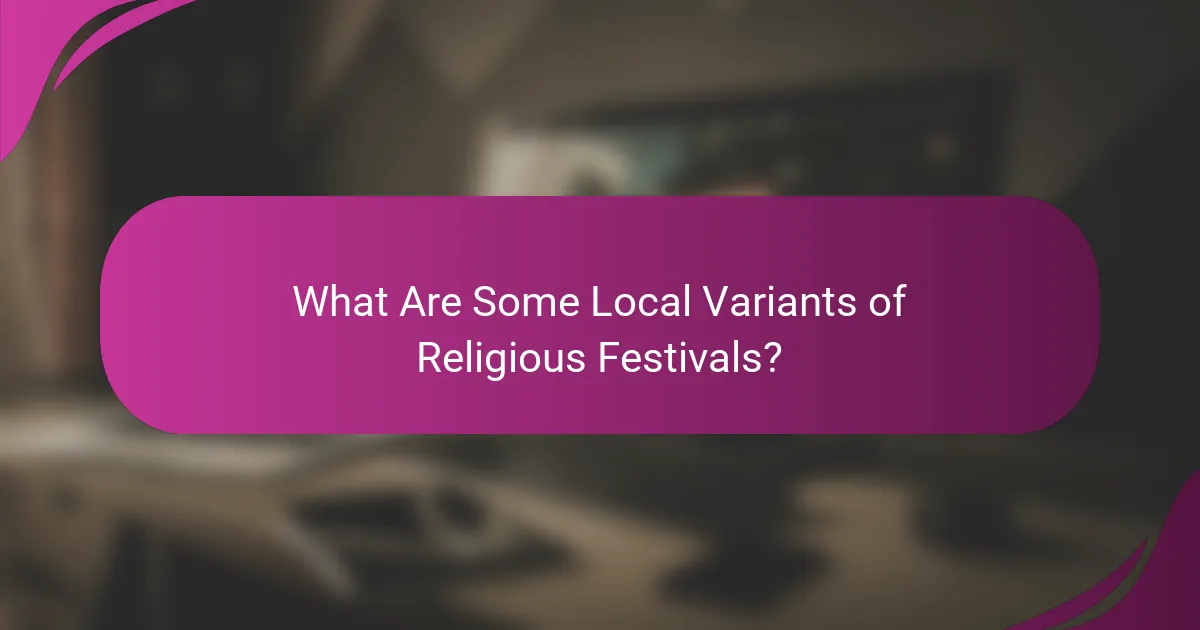
What Are Some Local Variants of Religious Festivals?
Local variants of religious festivals reflect the unique cultural practices and beliefs of different communities. These festivals often incorporate regional traditions, foods, and rituals that enhance the spiritual experience for participants.
Hindu Festivals
Hindu festivals vary widely across regions, with Diwali and Holi being two of the most celebrated. Diwali, the festival of lights, symbolizes the victory of light over darkness and is marked by lighting oil lamps, fireworks, and family gatherings. Holi, known as the festival of colors, celebrates the arrival of spring and involves throwing colored powders and water at each other.
In addition to these major festivals, local observances like Pongal in Tamil Nadu or Baisakhi in Punjab highlight agricultural cycles and community spirit. Each festival often includes specific rituals, traditional foods, and music that resonate with local customs.
Christian Festivals
Christian festivals such as Christmas and Easter are celebrated worldwide but have local flavors. In the United States, Christmas involves decorating trees, exchanging gifts, and attending church services, while in Italy, the Feast of the Immaculate Conception includes parades and local feasts.
Other local celebrations, like Carnival in Brazil, blend Christian traditions with indigenous and African influences, showcasing vibrant parades and music. These festivals often serve as a time for community bonding and spiritual reflection.
Islamic Festivals
Islamic festivals, including Eid al-Fitr and Eid al-Adha, are observed globally but have distinct local customs. Eid al-Fitr, marking the end of Ramadan, is celebrated with communal prayers, feasting, and giving to charity, with variations in food and traditions depending on the region.
Eid al-Adha, commemorating the willingness of Ibrahim to sacrifice his son, often involves communal prayers and the ritual sacrifice of animals. In countries like Turkey, the festival includes special dishes and family gatherings, emphasizing community and gratitude.
Buddhist Festivals
Buddhist festivals, such as Vesak, celebrate the birth, enlightenment, and death of the Buddha. In countries like Thailand, Vesak is marked by candlelight processions and temple visits, while in Sri Lanka, it includes decorating homes and temples with lanterns.
Other local observances, like the Obon festival in Japan, honor deceased ancestors and involve traditional dances and offerings. These festivals are opportunities for spiritual reflection and community engagement, rooted in local customs and beliefs.
